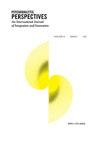Am I My Sibling’s Keeper? A Review of Working with Survivor Siblings in Psychoanalysis By Johanna Dobrich
Q4 Psychology
引用次数: 0
Abstract
Under even ordinary circumstances, siblings can be both a curse and a blessing. Just ask anyone who has them, and anyone who does not. Johanna Dobrich adds significantly to the literature on the important developmental role of sibling relationships, but with a twist. Her new book underscores the lack of examination of the undeniably critical, yet overlooked, role of sibling relationships in determining identity, ego strength, authenticity, and much more. Although this volume is mainly concerned with the negative impact of having a sibling, Dobrich wisely discusses how siblings, even extremely difficult ones, also contribute positively to our development and are a dynamic force in determining who we become. But her main thesis is far more specific. Dobrich put out a call on several listservs with the intention of recruiting not just any subjects, but psychoanalysts. Armed with the realization of the impact that her own compromised sibling had on her development, and how that contributed to her vocational choice, she sought out others with the same experience. What would they say about the impact of their siblings on their development? Did they become their sibling’s caregiver? If so, did they feel this role contributed heavily to them becoming analysts? More importantly, did they feel the guilt, shame, and anxiety that Dobrich herself has lived with for so long? Wanting to work through and integrate what having a challenging sibling meant to her, Dobrich embarks on a courageous investigative journey. She decides to put out a call for participation and receives fifteen responses from experienced analysts who had, indeed, been raised with a medically compromised我是我兄弟姐妹的守护者吗?Johanna Dobrich在心理分析中与幸存者兄弟姐妹合作的回顾
即使在普通情况下,兄弟姐妹也可能是一种诅咒和祝福。只要问问谁有,谁没有。Johanna Dobrich在关于兄弟姐妹关系的重要发展作用的文献中做了大量补充,但也有一些转折。她的新书强调了对兄弟姐妹关系在决定身份、自我力量、真实性等方面所起的不可否认的关键但被忽视的作用缺乏研究。尽管这本书主要关注有兄弟姐妹的负面影响,但Dobrich明智地讨论了兄弟姐妹,即使是极其困难的兄弟姐妹,如何对我们的发展做出积极贡献,并成为决定我们成为谁的动力。但她的主要论文要具体得多。多布里奇向几家列表服务公司发出呼吁,不仅要招募任何受试者,还要招募精神分析学家。意识到自己妥协的兄弟姐妹对她的发展产生的影响,以及这对她的职业选择有何影响,她找到了其他有同样经历的人。对于兄弟姐妹对他们发展的影响,他们会怎么说?他们成为兄弟姐妹的看护人了吗?如果是这样的话,他们觉得这个角色对他们成为分析师有很大帮助吗?更重要的是,他们是否感受到了多布里奇自己生活了这么长时间的内疚、羞耻和焦虑?Dobrich想弄清楚并理解有一个富有挑战性的兄弟姐妹对她意味着什么,她开始了一段勇敢的调查之旅。她决定发出参与的呼吁,并收到了来自经验丰富的分析师的15份回复,这些分析师确实是在一个患有医学缺陷的情况下长大的
本文章由计算机程序翻译,如有差异,请以英文原文为准。
求助全文
约1分钟内获得全文
求助全文

 求助内容:
求助内容: 应助结果提醒方式:
应助结果提醒方式:


